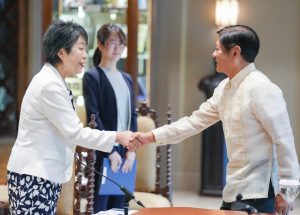The Philippines and Japan yesterday signed a crucial military agreement permitting the deployment of their forces on each other’s soil, against a backdrop of growing tension in the South China Sea.
The Reciprocal Access Agreement (RAA) was signed as the two nations’ foreign and defense ministers met for a “2+2” meeting in Manila yesterday morning, a follow-up to a meeting held in Tokyo in April 2022.
The RAA, which was first discussed during Prime Minister Kishida Fumio’s visit to the Philippines last year, will simplify the bureaucratic hurdles required in allowing troops from Japan and the Philippines to enter each other’s territory for joint exercises and other cooperative activities.
A statement from the Japanese Foreign Ministry stated that the RAA “will facilitate the implementation of cooperative activities, such as joint exercises and disaster relief between Japan and the Philippines and improve interoperability between the forces of the two countries.” In so doing, it will “will further promote security and defense cooperation between the two countries and firmly support peace and stability in the Indo-Pacific region.
In a joint briefing in Manila yesterday, Philippine Foreign Minister Enrique Manalo said that the signing of the RAA brought the bilateral defense partnership “to an unprecedented height.” Japan’s Defense Minister Minoru Kihara described it as a “groundbreaking” deal that would “enhance cooperation” between the Japan Self-Defense Forces and the Armed Forces of the Philippines. In a post on social media, Philippine President Ferdinand Marcos Jr. described Japan as “a partner in securing peace and prosperity in the Indo-Pacific.”
The Philippines is the third country with which Japan signed a reciprocal access pact, following Australia and the United Kingdom. It is also negotiating a similar agreement with France.
The RAA has emerged from shared concerns about the deteriorating security situation in the South China Sea, where the China Coast Guard has increased both the frequency and intensity of its incursions into Philippine waters since President Ferdinand Marcos Jr. took office two years ago. The Japanese Foreign Ministry’s statement specifically mentioned the “increasingly severe” security situation in the region.
China has focused its efforts on preventing the Philippine Navy from resupplying its garrison at Second Thomas Shoal, a Philippine-occupied feature in the Spratly Islands. This has resulted in a series of dangerous high-seas encounters, including an incident on June 17 that the Philippine military likened to an “act of piracy,” in which eight Filipino personnel were injured, one of them seriously.
In a joint statement issued after today’s 2+2 meeting, the two sides said that “the ministers expressed serious concern over the dangerous and escalatory actions by China at Second Thomas Shoal.” During yesterday’s joint press briefing, Japanese Foreign Minister Kamikawa Yoko, stressed the importance of peace and stability in the Indo-Pacific region, warning that Tokyo opposed “unilateral attempts to change status quo by force and coercion.”
Much of the attention has focused on the Philippines’ rapid strengthening of security ties with its security ally, the United States, but Japan has also been an important part of the Philippines’ strategy. In April, the Biden administration hosted the first Japan-U.S.-Philippines Summit in Washington, at the close of which the three nations “concurred to continue strengthening security and defense cooperation including through dialogues among defense authorities and joint exercises, as well as maritime safety cooperation.”
The signing of the RAA provoked a prickly response from a Chinese Foreign Ministry spokesperson, who referenced Japan’s history as a colonial power in Southeast Asia.
“During World War Two, Japan was responsible for invasion and colonial rule of Southeast Asian countries, including the Philippines,” spokesperson Lin Jian said in a regular press briefing yesterday. “Japan should seriously reflect on its history of aggression and be cautious in words and deeds in the field of military security.”
The RAA will take effect once it is ratified by the Philippine Senate and Japanese parliament.

































